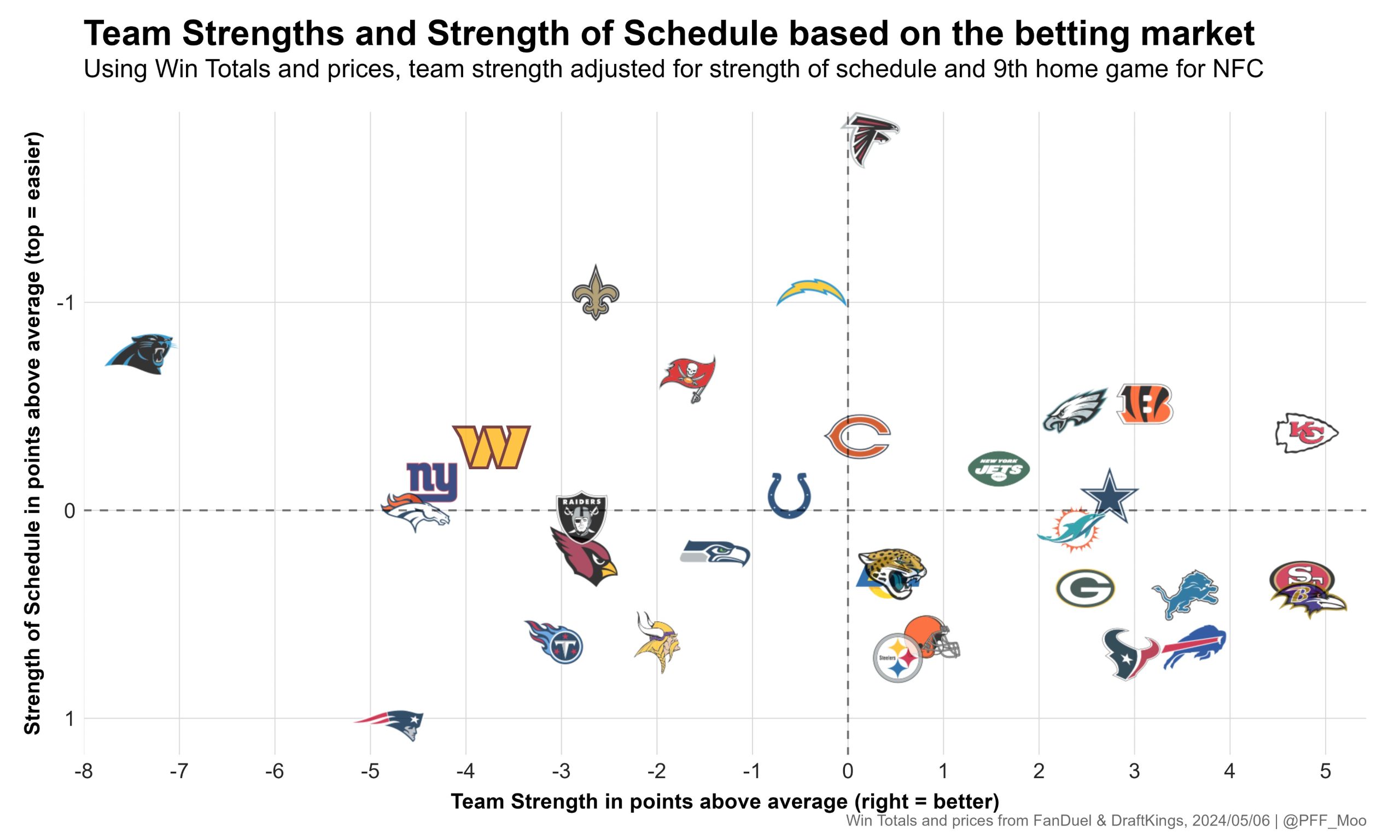• The competitive balance is seemingly fading away: The imbalance in the schedules is getting out of control and seemingly only heading in one direction.
• Not all things are equal when it comes to rest days: According to Warren Sharp, this year’s NFL schedule is unprecedented in several ways when it comes to rest days between NFL teams. The Baltimore Ravens will have a total advantage of 16 rest days relative to their opponents, whereas the 49ers will be at a disadvantage of 21 days relative to their opponents.
• The disparity in travel is an issue, too: The mileage to be racked up by teams this season is wildly different. The Los Angeles Chargers will travel over 26,800 miles, while the Washington Commanders will only just clear 10,500 miles by comparison.
• Get a head start on fantasy football: Use PFF's fantasy football mock draft simulator to create real live mock draft simulations to get ready for your live draft!
Estimated Reading Time: 5 minutes
The NFL schedule may be getting too unwieldy.
One of the defining goals of the schedule each season is competitive balance, and while that was one thing when former commissioner Bert Bell was creating the entire schedule by himself on his dining room table, that competitive balance is getting tougher to maintain as the league incorporates more elements in the pursuit of greater revenue.
It’s hard to say whether the league still values competitive balance—or “fairness”—in the schedule or whether it is simply yielding to the pressures of its own creation. But either way, the imbalance in the schedules is getting out of control and seemingly only heading in one direction.
The NFL recently announced a new broadcast package ahead of the 2024 season: Christmas Day games streaming exclusively on Netflix. Those games fall on a Wednesday this year, which means that the league schedule needs to force multiple teams into a crazy sequence of three games in 10 days.
That may not be a competitive disadvantage relative to each team playing on those Christmas Day games, but it certainly is relative to the teams that don’t need to undertake that truncated recovery gauntlet.
In several ways, the schedule is being stretched far beyond the point of fairness, and at some point, that needs to be recognized and pushed back against.
“Strength of Schedule”
This is the traditional way people view a team’s schedule. The usual methodology is to view it through the lens of the win percentage of their upcoming opponents from the previous season. However, because NFL roster turnover is as big as it is year-to-year, that’s clearly a very flawed way of viewing the upcoming schedule.
To combat that, a growing number of people now view strength of schedule as relative to the upcoming opponents' win totals according to the betting markets. So, instead of evaluating how good those teams were last season, the focus is on predicting how good they will be in the upcoming season.
Those betting lines obviously aren’t going to be perfectly accurate either, but they should be directionally closer than by examining how the team fared a year ago with no account for franchise-defining players who joined or departed.
For example, the New York Jets had a Hall of Fame-caliber quarterback play just four snaps for them a season ago. They expect to have him all season this year. Looking only at their win total from last season is looking at a body of evidence that omits the most important player on their roster.

Using this methodology, there is a significant gap between the Atlanta Falcons and the teams with tougher schedules, but this is in large part due to the expectation that the entire NFC South is weak and falls within the margins of the inevitable competitive imbalance of the schedule because of divisional games.
Rest Days
Another critical component of the schedule is rest days. Playing in the NFL is often compared to experiencing a car crash every game, and recovery to be able to do it all over again the next week is critical.
That recovery period used to be relatively constant: Sunday to Sunday, with the occasional Monday thrown in as a short week.
Now, the NFL has weekly Thursday night games, shortening that week even further. The Wednesday games on Christmas add an even shorter window to the mix, and when you factor in travel distances that now span continents rather than simply time zones within one country, the entire recovery process can be wildly disrupted.
NFL Schedule Release Day.
Here’s what players look at:
– First Game
– Bye Week
– Thursday Night Game
– Any other games that may disrupt routine/recovery (International, MNF, etc)
– Possible weather games (Buffalo in December, Miami in Sept, etc)— JJ Watt (@JJWatt) May 15, 2024
As J.J. Watt pointed out, one of the first things players look at when it comes to the schedule is “Any other games that may disrupt routine/recovery” because that is critical to playing well the next game.
In these terms, the imbalance in the schedule is getting out of hand.
According to Warren Sharp, this year’s NFL schedule is unprecedented in several ways when it comes to rest days between NFL teams. The Baltimore Ravens will have a total advantage of 16 rest days relative to their opponents, whereas the 49ers will be at a disadvantage of 21 days relative to their opponents.
For the 49ers, it is the second straight year that they are the most disadvantaged team in football when it comes to rest days, and the gap between the two teams is 37 days across a season that lasts just 122 days from start to finish.
Travel
You don’t have to be an NFL athlete to understand how much of a factor travel can be when it comes to winning and losing football games. Anybody who has had to travel a significant distance will know what it can take out of you, and even if NFL players are likely traveling in better comfort than you or I, they are also working with far finer margins in terms of peak performance (not to mention that they are generally far larger human beings to squeeze into whatever travel compartments they get).
If divisions were arranged geographically, the league would be off to a good start in terms of a level playing field, but even that isn’t close to the truth. Before they get anywhere, the travel distance racked up by certain teams is inevitably vastly more than others. This is only exacerbated by international games now being played in Brazil, London and Germany. The round-trip mileage for the games in Germany or Brazil for the teams taking part in them is upward of 9,000 per game.
Consequently, the mileage to be racked up by teams this season is wildly different. The Los Angeles Chargers will travel over 26,800 miles, while the Washington Commanders will only just clear 10,500 miles by comparison.
The gap, when looking at the average trip, only gets wider.
The Bottom Line
Routine and recovery are critical parts of playing good football week in and week out at the NFL level.
The focus on the NFL schedule has always been on how good a team’s upcoming opponents are, but we need to start shining a spotlight on the several other ways the NFL has allowed competitive imbalance to creep into the schedule as it tries to keep yet more financial plates spinning.
The league will continue to seek additional revenue streams, but there comes a point where this pursuit creates an unfair advantage for some teams and a disadvantage for others. Unless the awareness of how bad things are getting grows, they will continue to push the boundaries until the season is determined less by who the best teams are and more by which teams get the best composite of schedule advantages.





 © 2026 PFF - all rights reserved.
© 2026 PFF - all rights reserved.